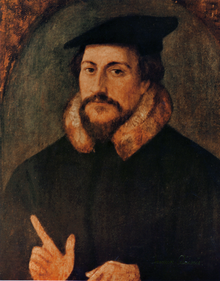John Calvin
| John Calvin | |
|---|---|

Portrait attributed to Hans Holbein the Younger
|
|
| Native name | Jean Calvin |
| Born |
Jehan Cauvin 10 July 1509 Noyon, Picardy, France |
| Died | 27 May 1564 (aged 54) Geneva, Switzerland |
| Education | |
| Occupation | Pastor, author, theologian |
| Notable work | Institutes of the Christian Religion |
| Theological work | |
| Tradition or movement | Reformed, Calvinist |
| Signature | |
John Calvin (/ˈkælvɪn/;French: Jean Calvin, pronounced: [ʒɑ̃ kalvɛ̃]; born Jehan Cauvin: 10 July 1509 – 27 May 1564) was an influential French theologian and pastor during the Protestant Reformation. He was a principal figure in the development of the system of Christian theology later called Calvinism, aspects of which include the doctrines of predestination and of the absolute sovereignty of God in salvation of the human soul from death and eternal damnation, in which doctrines Calvin was influenced by and elaborated upon the Augustinian and other early Christian traditions. Various Congregational, Reformed, and Presbyterian churches, which look to Calvin as the chief expositor of their beliefs, have spread throughout the world.
Calvin was a tireless polemic and apologetic writer who generated much controversy. He also exchanged cordial and supportive letters with many reformers, including Philipp Melanchthon and Heinrich Bullinger. In addition to his seminal Institutes of the Christian Religion, Calvin wrote commentaries on most books of the Bible, confessional documents, and various other theological treatises.
...
Wikipedia
